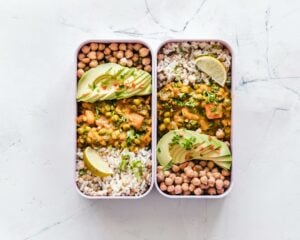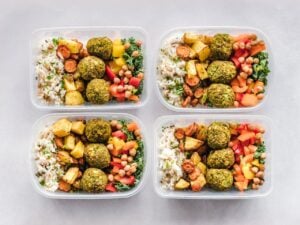A Comprehensive Plant-Based Protein Guide
The rising popularity of plant-based food has inspired a great deal of research and interest into the topic of plant-based protein guide. There are many myths surrounding plant-based protein and how it is used to compare to animal-based protein.
Recently, we are experiencing a rise in vegan diets. Many people choose to eat a plant-based diet to help improve their health and longevity, and this lifestyle is a popular choice for those who practice a more sustainable lifestyle. A plant-based diet is an environmentally friendly way to consume protein, as it does not require the need for the slaughter of animals or the use of animal products, like eggs and dairy.
In this article, we’ll take a look over the best foods for a plant-based protein guide. These are the foods that provide you with a good source of protein and are also great for the environment. These are the top protein sources for plant-based diets, and they’re also foods that you can easily integrate into your diet.
Why Do We Need Protein?
Protein is an essential nutrient that the body needs to maintain proper health and wellness. Protein is broken down into amino acids, which are the building blocks of the body.
Protein is good for building muscle, helps to keep a healthy weight, repairs tissue, maintains bone health, regulates sugar levels, and supports blood pressure.
Another reason why protein is so important is that it helps to regulate the body’s metabolism. High protein meals are known to help keep you feeling fuller longer and can help keep you from overeating.
Benefits Of Eating Plant-Based Protein
Plant-based protein is a great alternative to replace or reduce your animal-based protein. The benefits of eating plant-based protein include:
1. Good For Your Health
There are many reasons to eat a plant-based diet, and one of them is health. A plant-based protein is beneficial to your health, and it can help you to reduce your risk of heart disease, stroke, diabetes, cancer, and other diseases. Furthermore, plant-based proteins do not carry less-healthy compounds found in meat, including cholesterol and saturated fat.
2. Animal-Friendly
As we mentioned, plant-based protein is a great way to reduce your carbon footprint and to care for the environment. Animal farming is one of the biggest contributors to climate change, and it is a major cause of environmental degradation. In addition, animal farming is a major cause of deforestation, and it uses up a great deal of land and resources. Plant-based protein helps you practice a more sustainable lifestyle.
3. Nutritious
Plant-based protein is a great way to get the increased intake of fibers, vitamins, and nutrients that you need in your diet, and it’s a great way to make sure that you are consuming a variety of healthy, nutritious food.
How To Get Enough Protein On A Vegan Diet
In general, there are 9 essential amino acids that the body needs to carry on a regular basis to maintain good health. The body gets these nutrients by consuming protein. And while there are many protein-rich foods, it is possible to get all the protein that you need from plant-based sources.
If you are considering a vegan diet, there are a few things that you need to know about how to get enough protein. The trick is to make sure that you are eating a variety of foods, including fresh plant-based ingredients. In addition, avoid refined foods, as these foods lack nutrients, vitamins, minerals, and fiber.
Protein Sources For A Plant-Based Diet
There are many plant-based protein sources that you can easily choose from. So where can you find protein in a plant-based diet? Some of the most popular sources include:
1. Grains
As many people know, grains are a staple in the diets of millions of people across the globe. The truth of the matter is that grains are a popular source of plant-based protein and can easily be incorporated into your diet. They are a good source of fiber, minerals, and B vitamins.
Some of the most common grains that supply a good plant-based protein diet include whole wheat, quinoa, corn, rice, and barley, oats, teff, millet, couscous, wild rice, and amaranth.
2. Soy
Soy is a popular source of protein, and for good reason. It’s easy to prepare, it’s cheap, and it’s delicious.
This is one of the most versatile foods in the world, used in everything from tofu to soymilk, soy sauce. Soy is a low source of carbohydrates and fat. Also, soy is rich in a variety of vitamins, minerals, and antioxidants
3. Legumes
Eating legumes is an easy way to give your body the protein it needs to thrive, but many people are not aware of the protein content of legumes. The protein that you get in legumes is complete and full of nutrients, including iron, vitamins, fiber, zinc, and calcium.
There are many varieties of legumes that provide the protein you need such as beans, peas, chickpeas, edamame, and lentils. Beans are best eaten cooked, and they can be easily incorporated into your diet by making bean burgers, hummus, bean chili, and bean soup.
4. Nuts
Nuts are a good source of protein and are often a popular snack for many people. Nuts are also high in omega-3 fatty acids, antioxidants, and anti-inflammatory properties.
As a result, nuts are especially good for those who have chronic inflammatory conditions such as cardiovascular disease, arthritis, and autoimmune conditions. Try adding more of these nuts full of protein to your diet: walnuts, almonds, brazil nuts, cashews, peanuts, pistachios, and hazelnuts.
5. Seeds
Seeds are also a good source of plant-based protein, heart-healthy fats, antioxidants, and fibers.
Some types of seeds that you can easily add to your diet include chia, pumpkin, sesame, hemp, flaxseeds, and sunflower seeds. These can be sprinkled on top of salads or added to stir-fry.
6. Vegetables
Did you know that spinach, broccoli, brussels sprouts, potatoes, sweet potatoes, and artichokes. have a surprisingly high amount of protein? While meat is a great source of protein, you may be surprised to learn that some vegetables have more protein per gram than meat does. And the best news is that some vegetables are easy to cook and can be eaten with a variety of other foods.
In general, vegetables have a lot of protein and fiber, and they can be easily added to your diet.
How To Get Started With Protein Sources For Plant-Based Diet
People nowadays have a busy lifestyle that doesn’t always allow time to cook a full meal. However, as busy as people are, they are also health-conscious. They want to eat healthy, nutritious food, but they also want to eat food that is convenient.
This is why people are turning to homemade food delivery services. Gobble’s services allow you to order online protein sources for plant-based diet meals prepared by a chef and then delivered to your home. This is a great way to eat healthy, convenient meals without hours of rides to the supermarket.
Check out the 10 Best High Protein Meal Delivery Services to Help Hit Your Fitness Goals.



